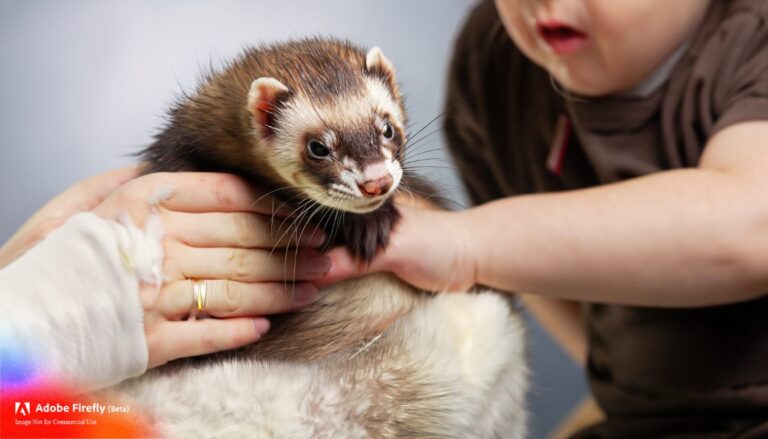
When it comes to keeping our furry friends clean and fresh, it’s natural to wonder what products are safe to use. As a ferret owner myself, I’ve often questioned whether or not dish soap can be used to bathe these curious creatures. In this article, I’ll delve into the topic and provide you with all the information you need to know about using dish soap on ferrets. So, let’s get started and find out if it’s a viable option for keeping our adorable ferrets squeaky clean!
The Importance of Keeping Ferrets Clean
Ensuring proper hygiene and cleanliness for your ferret is essential for their overall health and well-being. As a ferret owner myself, I understand the significance of maintaining their cleanliness and keeping them free from dirt, oils, and odors. Here are a few reasons why keeping your ferret clean is so important:
1. Prevention of Skin Conditions: Ferrets have delicate skin that is sensitive to dirt and oils. If not kept clean, they are more susceptible to developing skin conditions such as dermatitis and acne. These conditions can cause discomfort and even lead to more serious issues if left untreated.
2. Odor Control: Ferrets have a distinct musky odor that can become quite strong if not properly managed. Regular bathing and cleaning help in reducing this odor, making your ferret a more pleasant companion to be around.
3. Prevention of Parasites: A dirty ferret is more likely to attract parasites such as fleas and ticks. These parasites can not only cause discomfort to your furry friend but may also transmit diseases. By keeping your ferret clean, you can minimize the risk of these pesky parasites invading their coat.
4. Bonding and Socialization: Regular grooming and cleaning sessions provide an excellent opportunity for bonding with your ferret. It allows you to spend quality time together and helps to foster a trusting relationship between you and your pet.
To achieve optimal cleanliness for your ferret, you may consider using a mild shampoo specifically formulated for ferrets. However, common dish soaps, despite being effective for cleaning dishes, are not suitable for bathing these little creatures. Dish soaps can strip their coat of its natural oils and disrupt the pH balance of their skin, leading to dryness and irritation.
Instead, opt for ferret-friendly shampoos that are gentle on their skin and coat. Additionally, make sure to use lukewarm water during the bathing process, as extreme temperatures can cause stress to your pet.
In the next section, we will explore safe alternatives for bathing ferrets and provide useful tips to ensure a pleasant and effective bathing experience for both you and your ferret.
Understanding the Composition of Dish Soap
When it comes to the care of our beloved ferrets, it’s important to choose the right products for their hygiene routine. One common question that arises is whether or not dish soap can be used on ferrets. In this section, I will dive into the composition of dish soap and explain why it may not be suitable for our furry friends.
Dish soap is designed for a specific purpose – to cut through grease and grime on our dishes. Its composition is formulated to remove food residue and oil, leaving our dishes squeaky clean. However, the ingredients that make dish soap effective for cleaning dishes may not be ideal for bathing ferrets.
One key aspect to consider is the pH balance of dish soap. Ferrets have a delicate pH balance on their skin, and using dish soap can disrupt this balance. The high alkaline content in many dish soaps may lead to dryness, irritation, and potential skin conditions in ferrets. This is because dish soap is designed to strip away oils, including the natural oils that keep a ferret’s skin and coat healthy.
In addition, dish soaps often contain fragrances and other additives that can be harmful to ferrets. Scented dish soaps may cause skin allergies or irritations in our little furry friends. It’s crucial to opt for gentle, fragrance-free products specifically developed for ferrets to avoid any potential risks.
To sum up, while dish soap may be effective for dishes, it’s not the best option for bathing ferrets. Its composition, high alkaline content, and potentially harmful additives make it unsuitable for our furry companions. Next, let’s explore safe alternatives that are designed to keep ferrets clean, healthy, and happy.
Potential Risks and Side Effects of Using Dish Soap on Ferrets
When it comes to keeping our ferrets clean, it’s important to prioritize their safety and well-being. While dish soap may seem like a convenient option for bathing our furry friends, it can actually pose several risks and side effects.
1. Stripping of Natural Oils: Dish soap is designed to cut through grease and grime on dishes, but it can also strip away the natural oils that are essential for a ferret’s healthy coat and skin. These natural oils not only keep their fur soft and shiny but also protect their skin from drying out and becoming irritated.
2. Disruption of pH Balance: Ferrets have a delicate pH balance on their skin, and using dish soap can disrupt this balance. The high alkaline content in dish soap can alter the pH of their skin, leading to dryness, irritation, and even skin conditions such as dermatitis.
3. Potential Harmful Additives: Dish soap often contains additives such as fragrances, dyes, and other chemicals that can be harmful to ferrets. These additives can cause allergic reactions, skin irritations, and even respiratory issues when exposed to their sensitive respiratory systems.
4. Skin Conditions: The combination of stripped natural oils, disrupted pH balance, and potentially harmful additives can increase the risk of various skin conditions in ferrets. This includes dry skin, flakiness, redness, itchiness, and the development of more severe conditions like bacterial or fungal infections.
As responsible ferret owners, it is crucial that we prioritize their health and well-being. Instead of using dish soap, it’s recommended to opt for gentle, fragrance-free products specifically developed for ferrets. These products are designed to respect the unique needs of their skin and coat, helping to maintain their natural oils, pH balance, and overall skin health.
By using appropriate bathing products, we can keep our ferrets clean, healthy, and happy, while avoiding the potential risks and side effects associated with using dish soap. So, let’s make sure we provide our little companions with the care they deserve and choose the right products for their grooming routine.
Alternative Options for Bathing Ferrets
Now that we know the potential risks and side effects of using dish soap on ferrets, it’s important to explore alternative options for keeping our furry friends clean and healthy. Here are some gentle and effective alternatives to consider:
Ferret-Specific Shampoos
Using a shampoo specifically formulated for ferrets is the best way to ensure their skin and coat stay in optimal condition. These shampoos are designed to be gentle enough for their sensitive skin and won’t strip away the natural oils necessary for a healthy coat. Look for shampoos that are fragrance-free and have a pH-balanced formula to maintain the proper pH balance on your ferret’s skin.
Waterless Shampoos
Waterless shampoos can be a great option for spot cleaning or in between regular baths. These shampoos come in a spray or foam form and can be applied to your ferret’s coat without the need for water. They are specially formulated to effectively remove dirt and odor without causing any irritation. It’s important to choose a waterless shampoo that is safe for use on ferrets and follow the instructions provided.
Wet Wipes
Wet wipes are another convenient option for keeping your ferret clean and fresh. There are wet wipes specifically made for ferrets that are designed to be gentle on their skin. You can use these wipes to gently wipe down your ferret’s fur, paying attention to areas that may need extra cleaning such as the paws and tail. Just make sure to choose wipes that are fragrance-free and free of any harsh chemicals.
Dry Shampoos
Dry shampoos are a powder-based option that can be sprinkled onto your ferret’s coat and massaged in. The powder absorbs excess oils and helps remove dirt and odor. It’s important to choose a dry shampoo that is safe for use on ferrets and avoid getting the powder near your ferret’s eyes, ears, or nose. Gently brush out the powder after applying to ensure a clean and fresh coat.
By using these alternative options, you can keep your ferret clean and smelling great without putting their health at risk. Remember, it’s important to always prioritize their well-being by using products specifically developed for their unique needs.
Conclusion
Using dish soap on ferrets can have negative consequences for their health and well-being. Dish soap can strip away the natural oils that protect their coat and skin, disrupt their pH balance, and contain harmful additives. This can lead to dryness, irritation, and various skin conditions in ferrets.
To ensure the health of your ferret, it is important to use gentle, fragrance-free products specifically developed for them. There are several alternative options for bathing ferrets that are designed to be safe and effective. These include ferret-specific shampoos, waterless shampoos, wet wipes, and dry shampoos. These alternatives are formulated to be gentle on a ferret’s skin and coat, while effectively removing dirt and odor and maintaining the proper pH balance.
By opting for these alternative options, you can keep your ferret clean, healthy, and happy without risking their well-being. Prioritizing the use of products specifically made for ferrets will help you maintain their overall health and prevent any potential risks associated with using dish soap.






